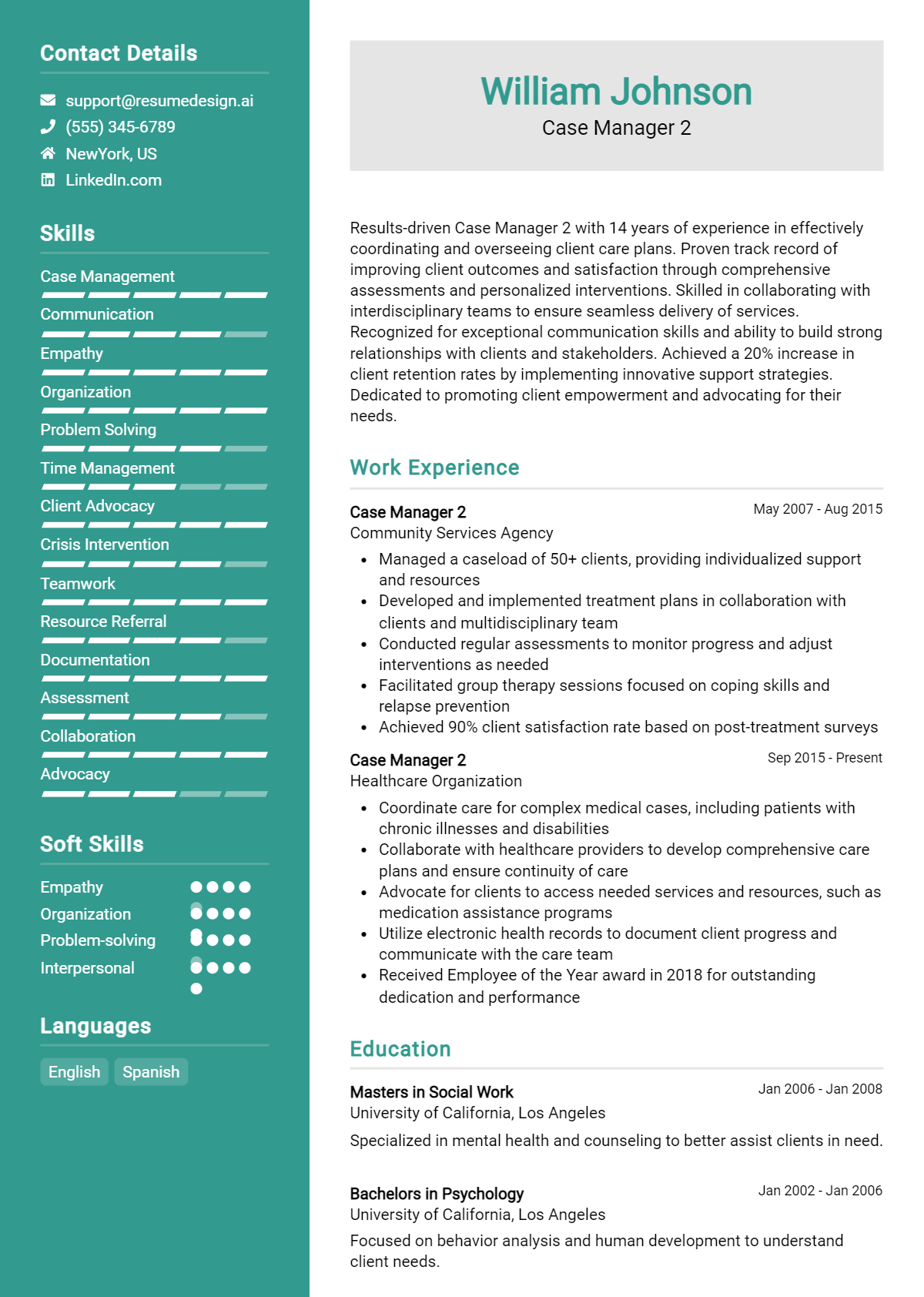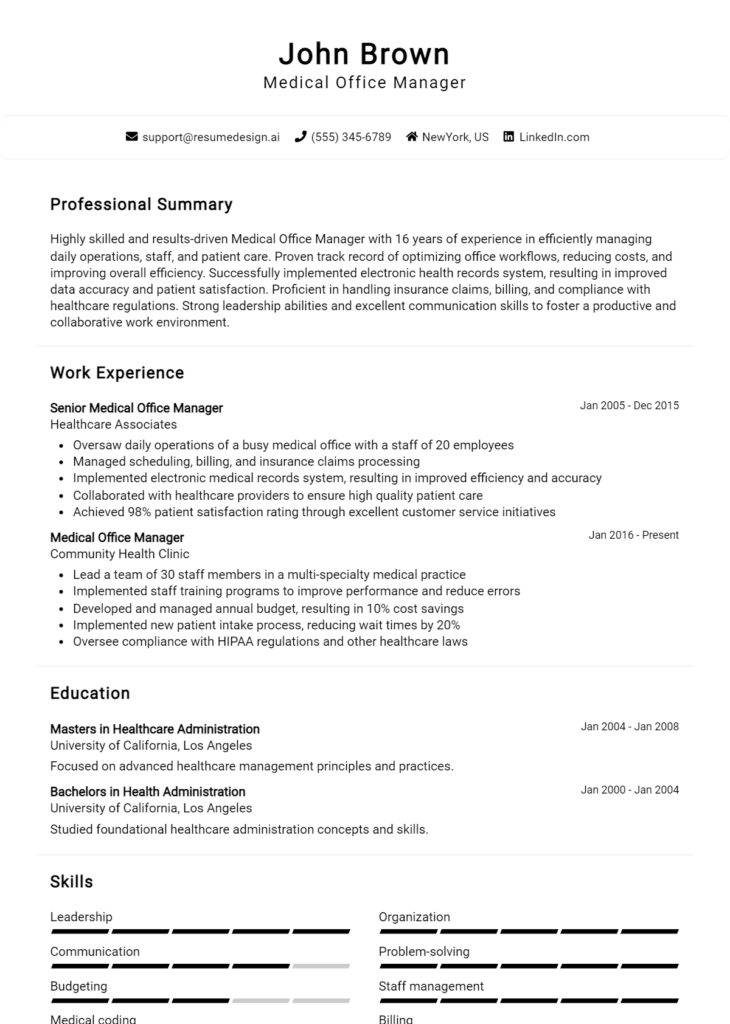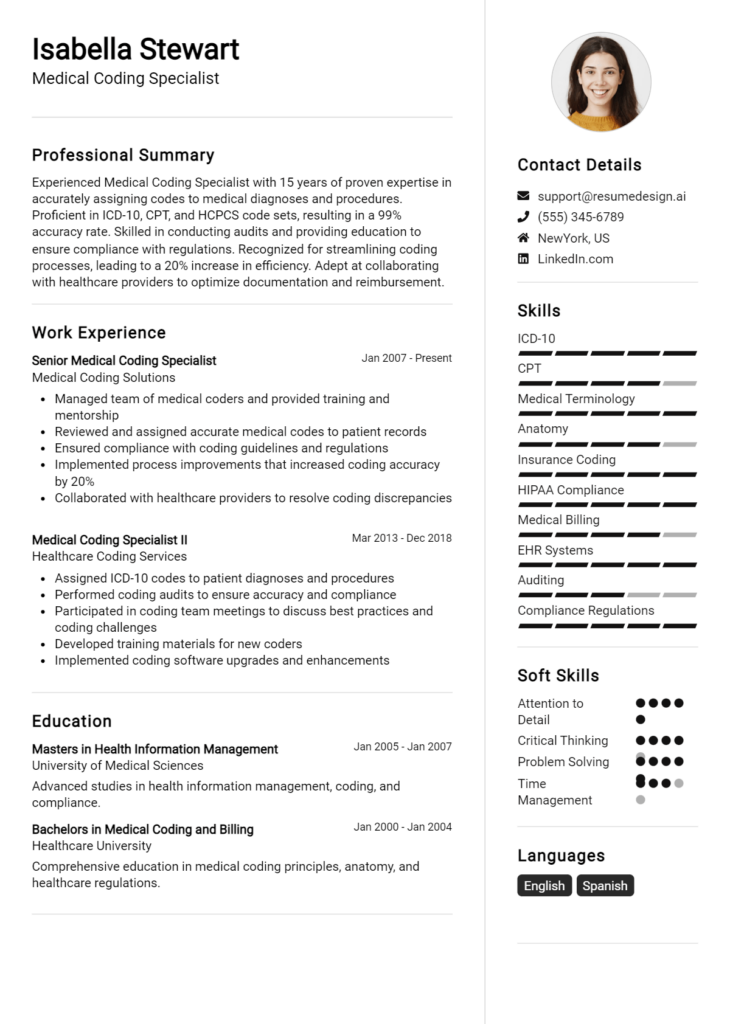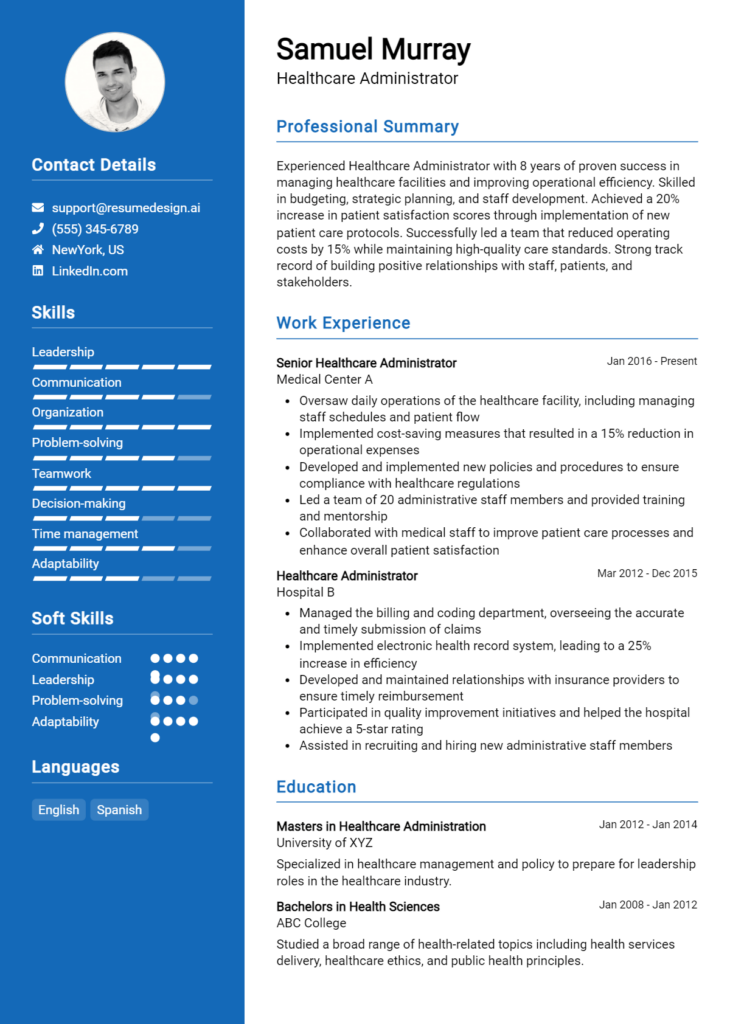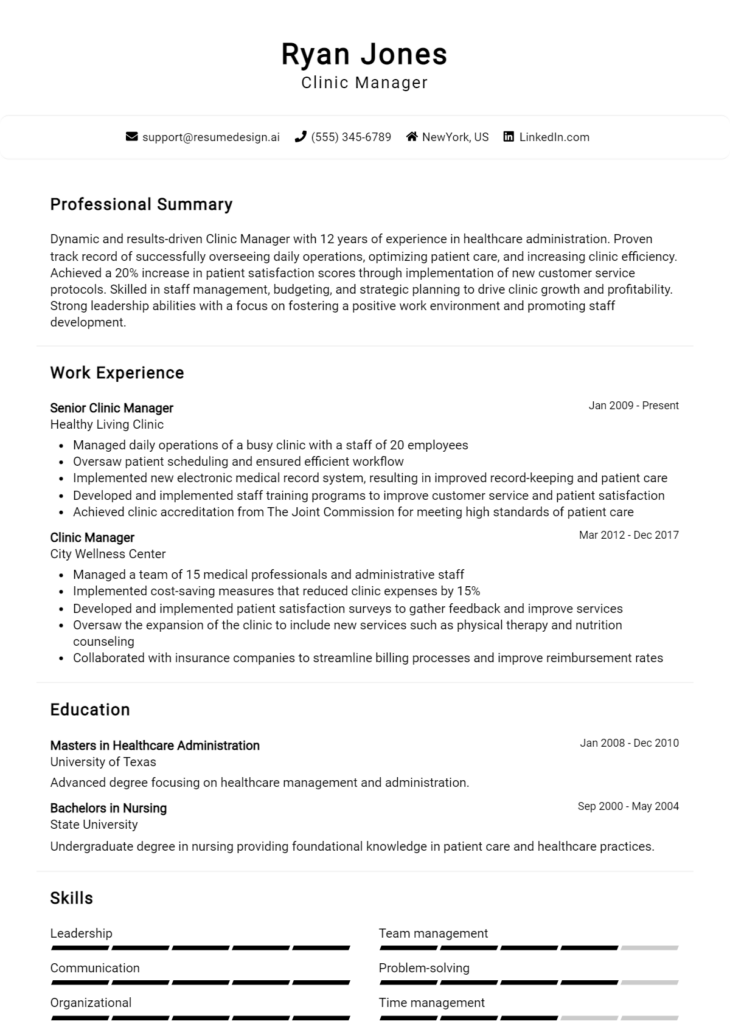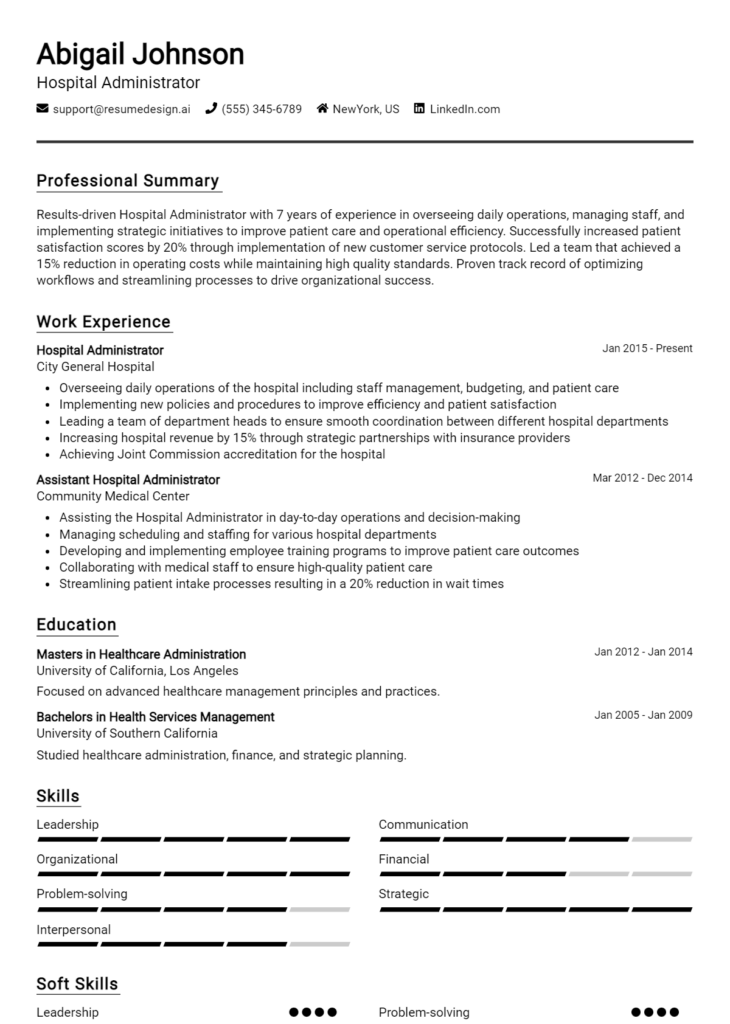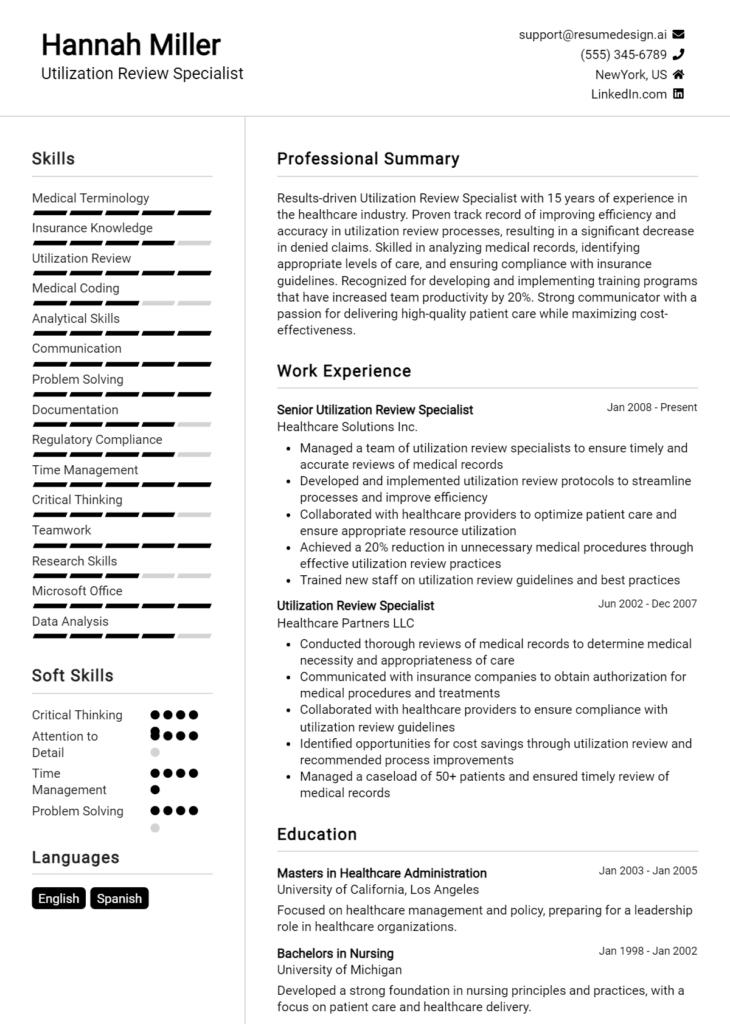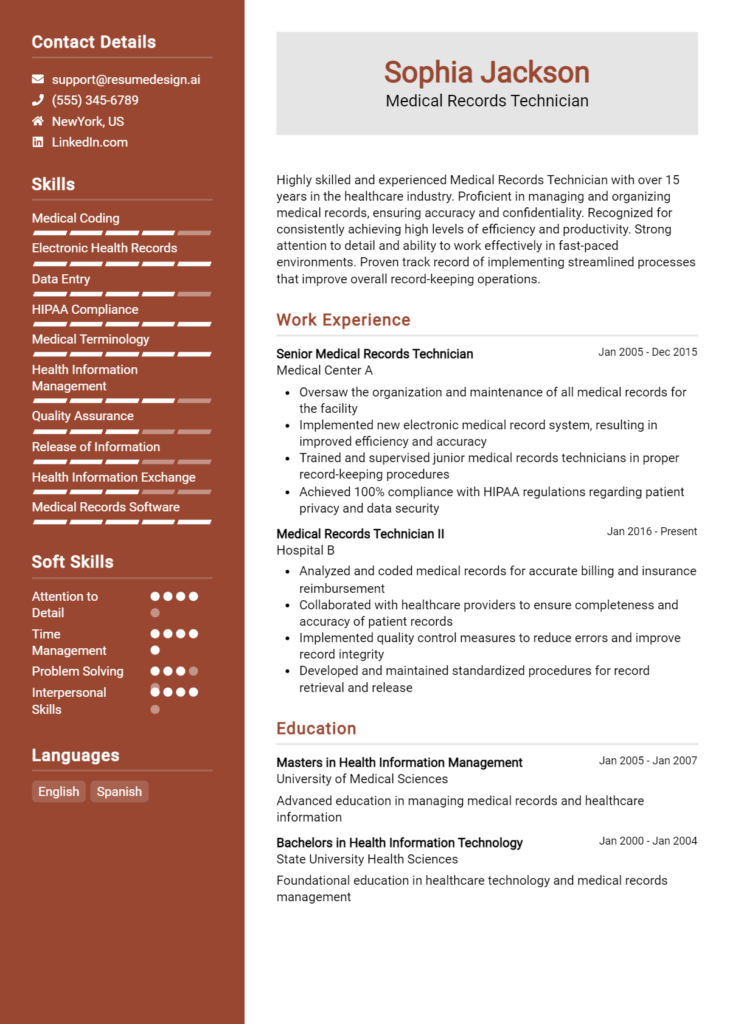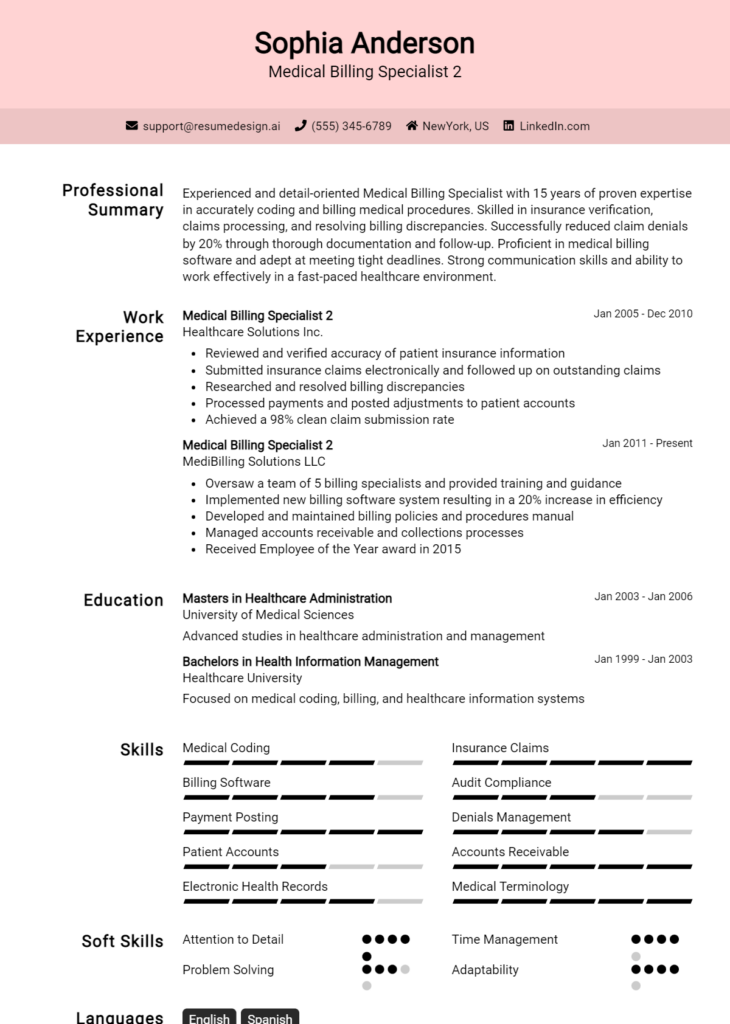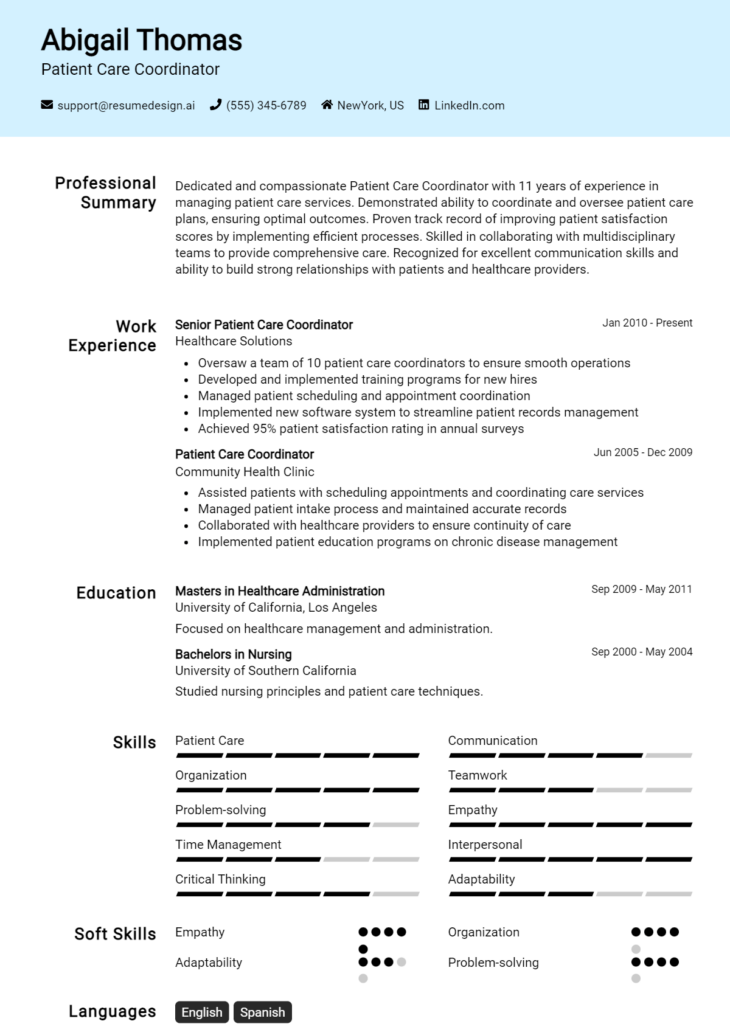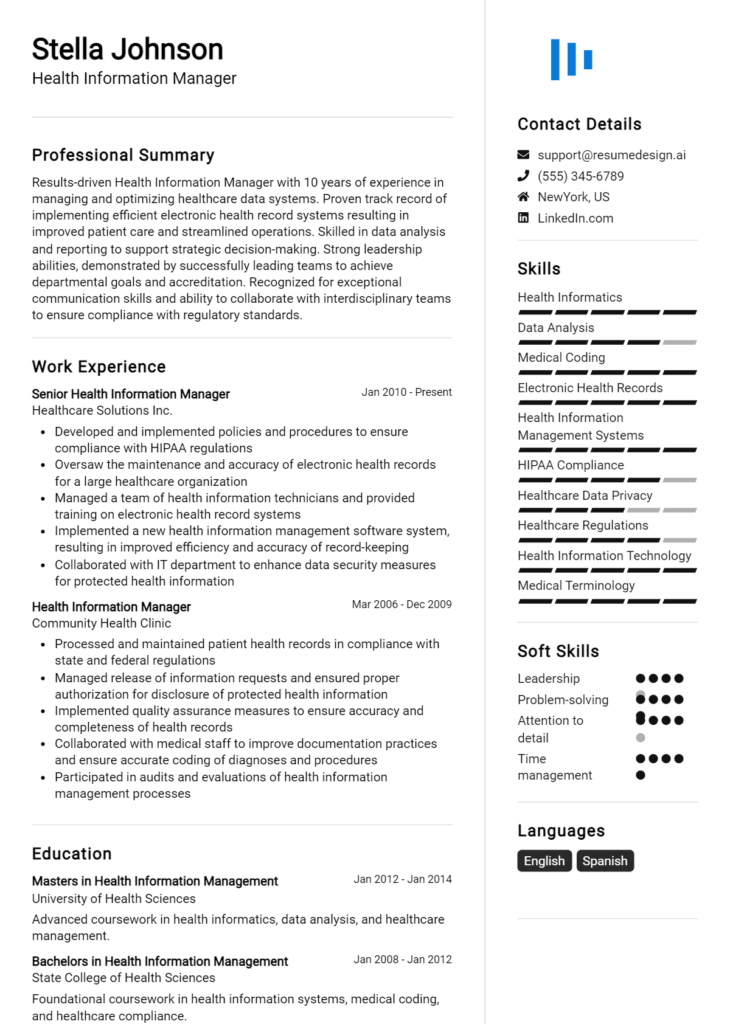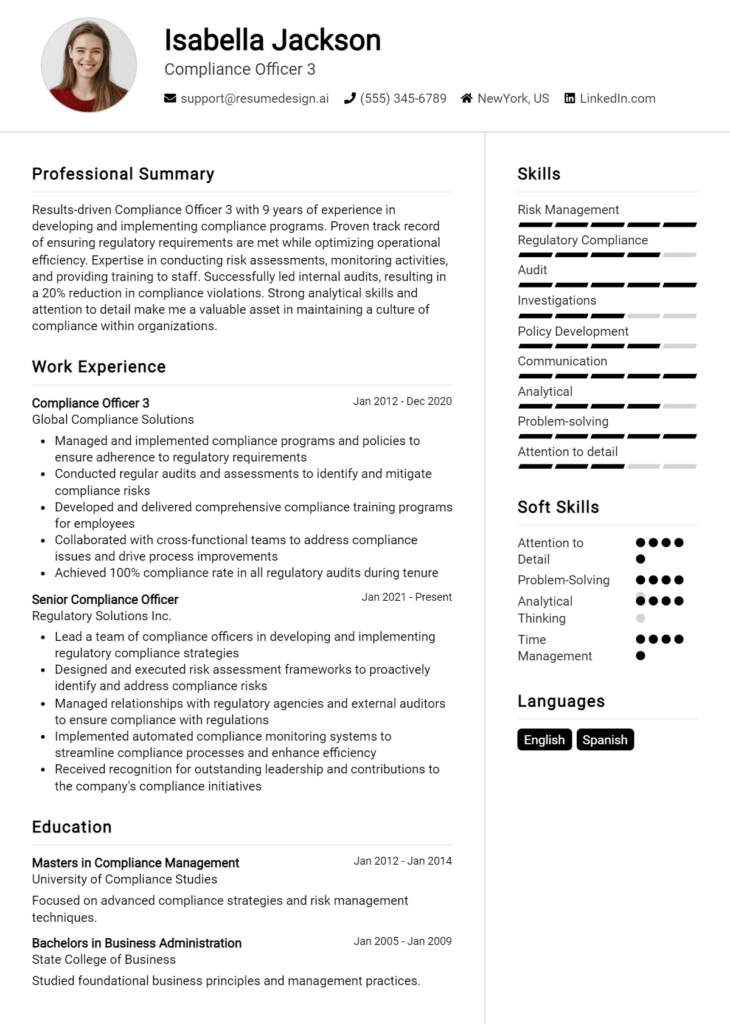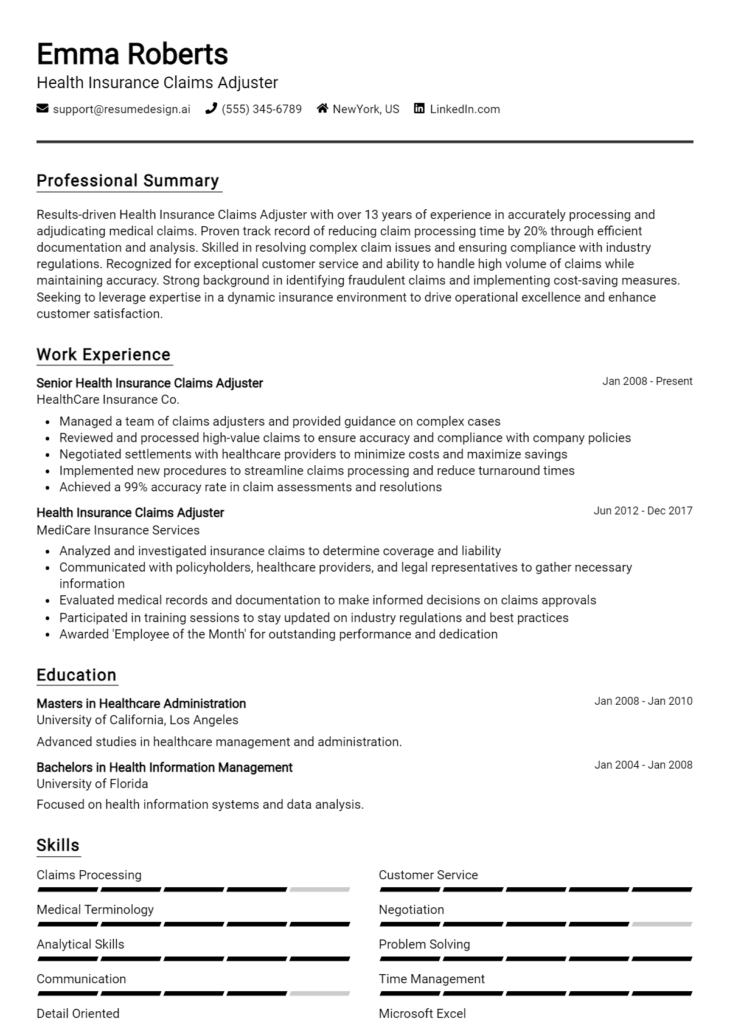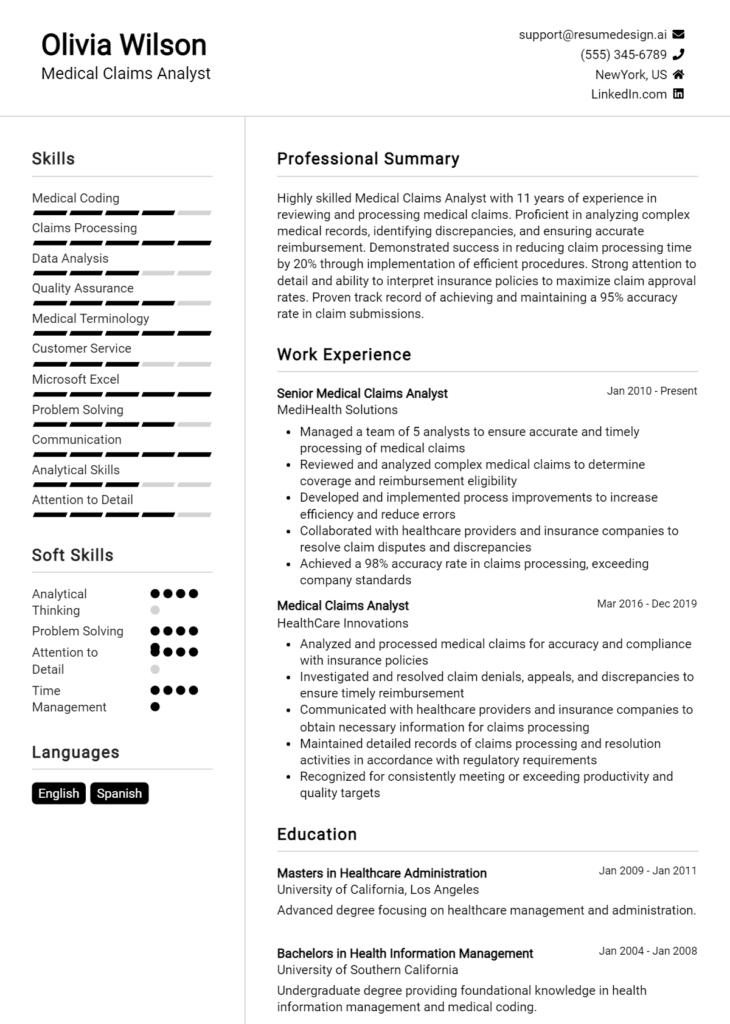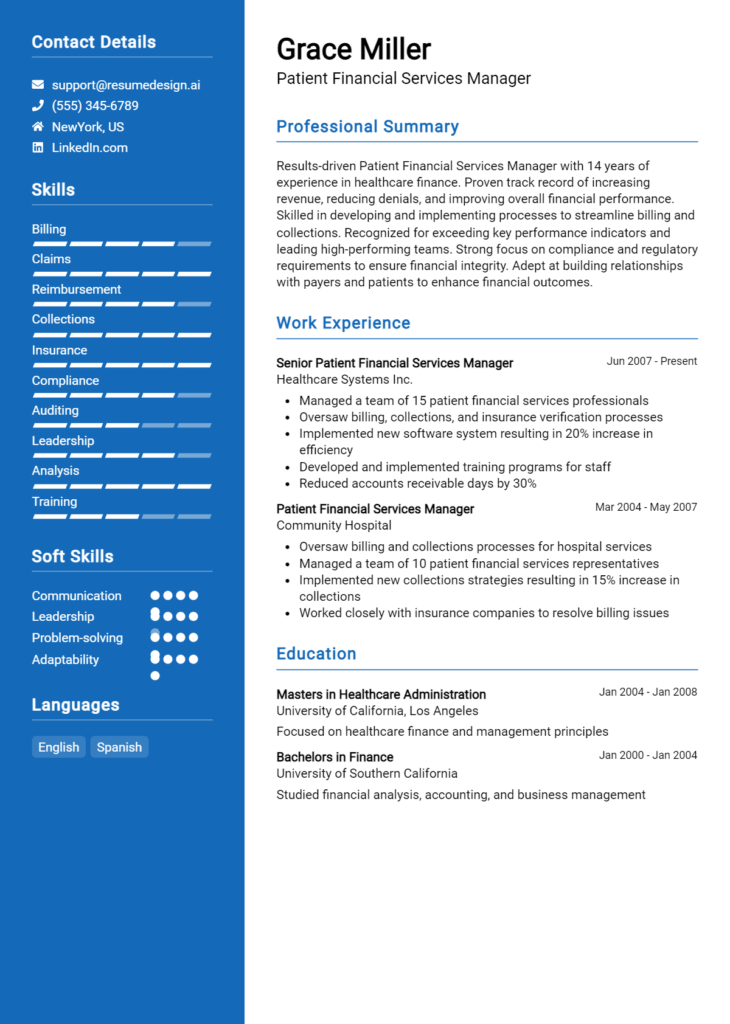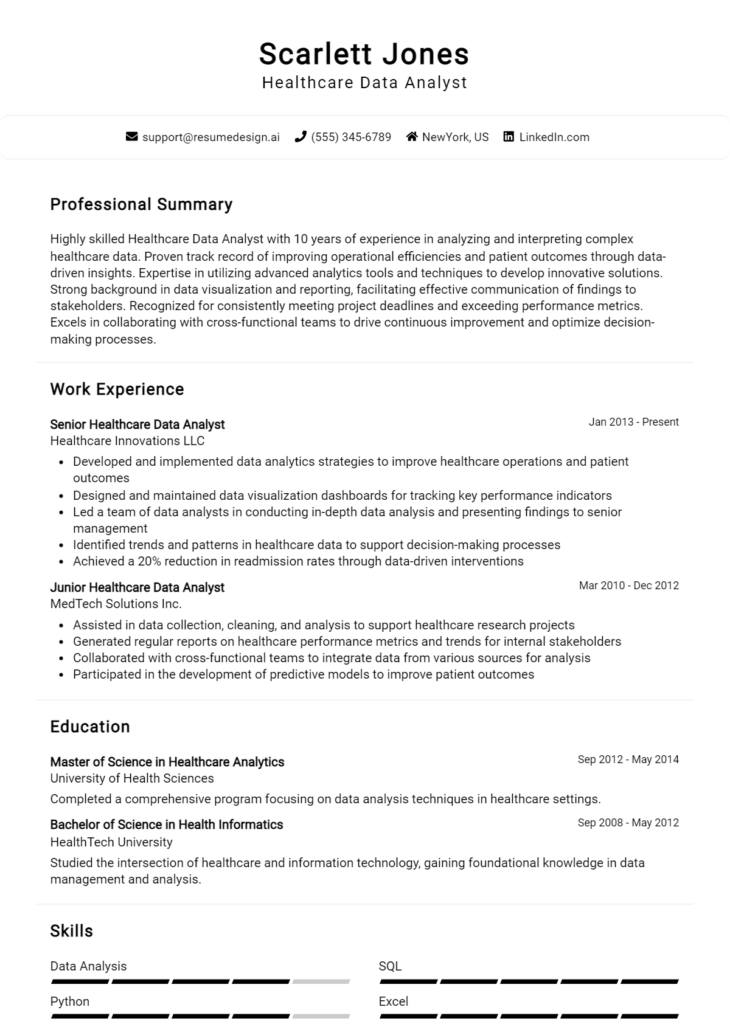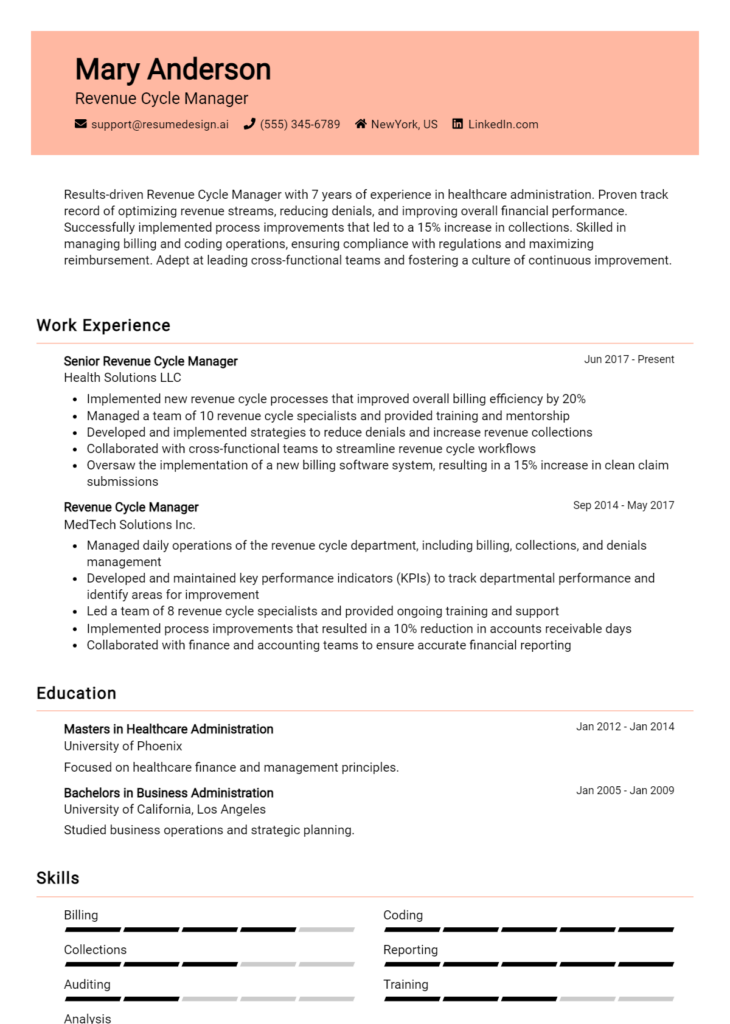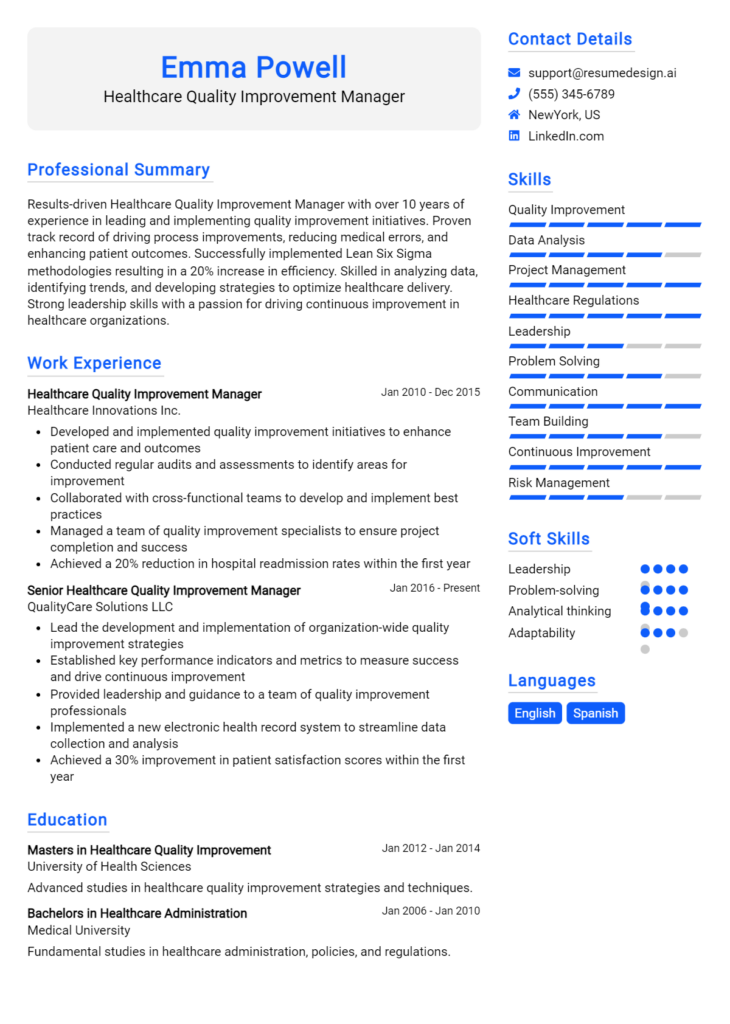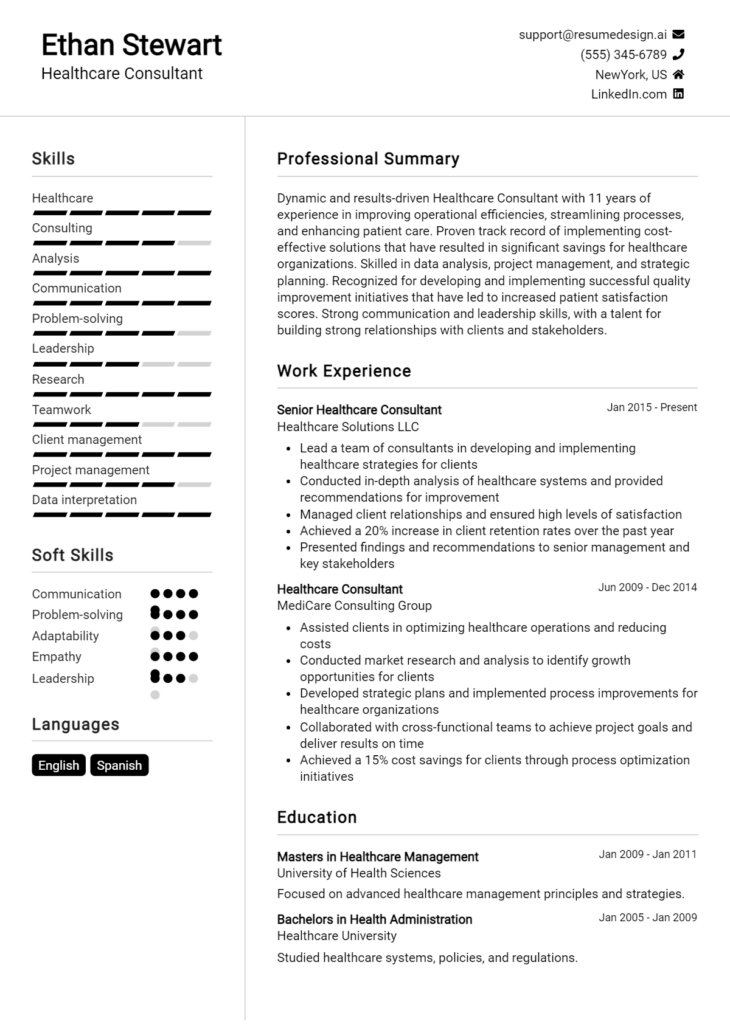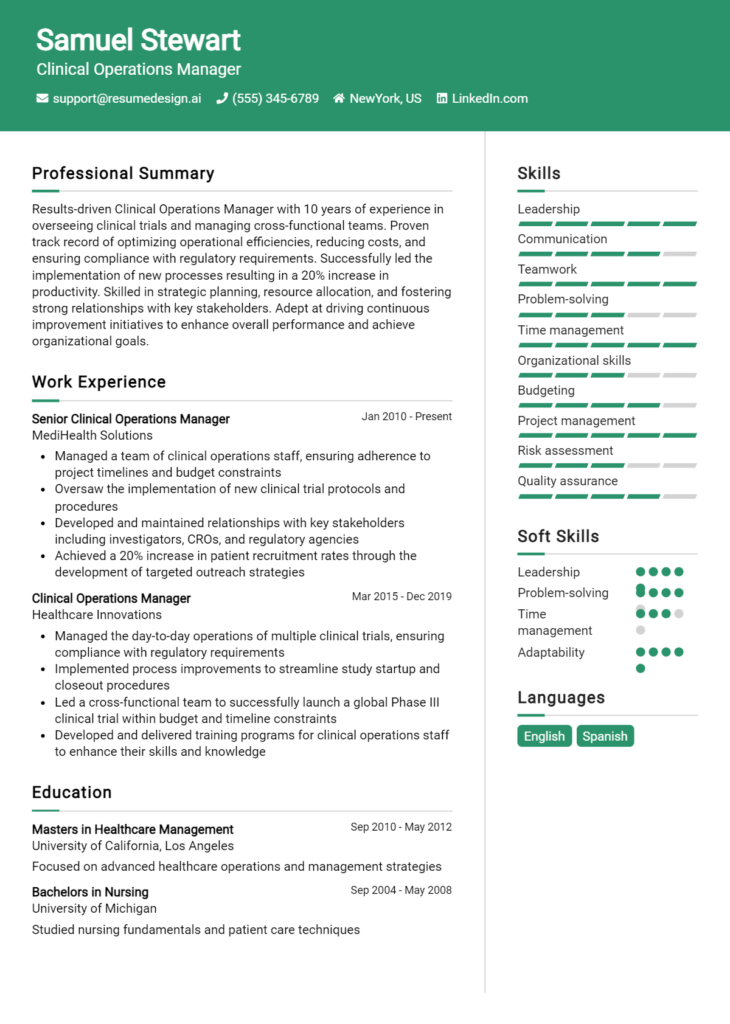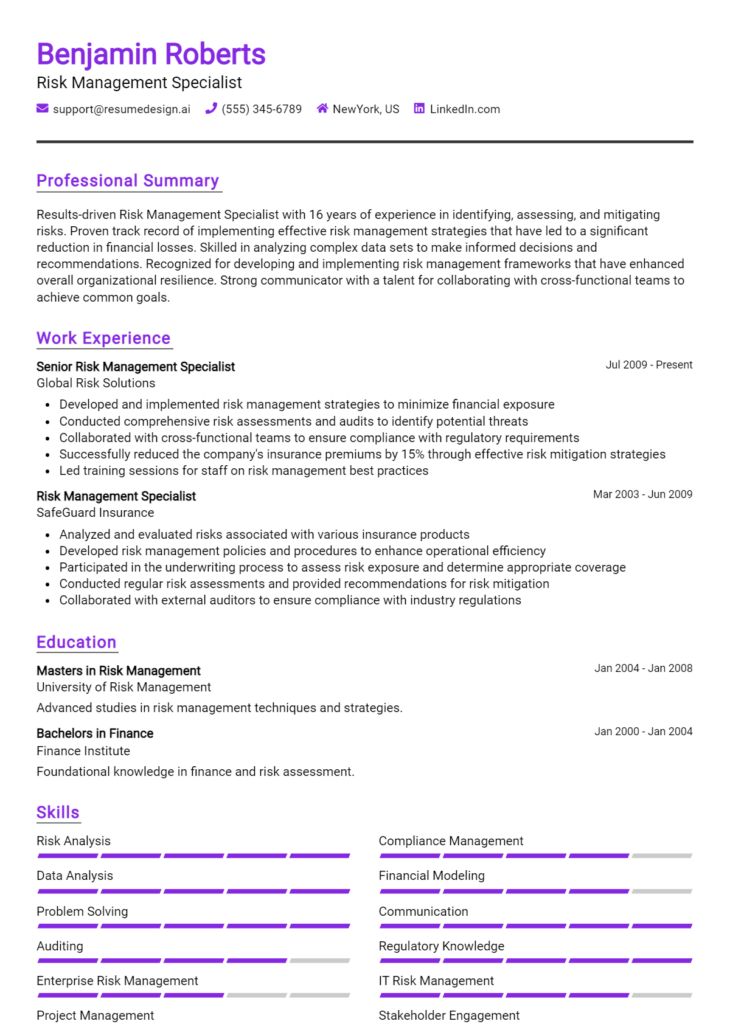Case Manager Core Responsibilities
A Case Manager plays a crucial role in coordinating patient care, bridging departments such as healthcare, social services, and community resources. They are responsible for assessing client needs, developing care plans, and ensuring that services are effectively delivered. Essential skills include technical proficiency in case management software, operational efficiency, and strong problem-solving abilities. These competencies are vital for achieving organizational goals, and a well-structured resume can effectively highlight these qualifications to potential employers.
Common Responsibilities Listed on Case Manager Resume
- Conduct comprehensive assessments of client needs and resources.
- Develop and implement individualized care plans.
- Coordinate services across various healthcare and social service providers.
- Monitor client progress and adjust care plans as necessary.
- Advocate for clients to ensure access to appropriate services.
- Maintain accurate and timely documentation of client interactions.
- Educate clients and families about available resources and services.
- Collaborate with interdisciplinary teams to enhance client outcomes.
- Manage caseloads effectively to meet organizational benchmarks.
- Provide crisis intervention and support as needed.
- Stay informed on relevant laws and regulations affecting case management.
High-Level Resume Tips for Case Manager Professionals
In the competitive field of case management, a well-crafted resume is not just a document; it’s your personal marketing tool. As the first impression you make on potential employers, your resume needs to effectively showcase your skills, experience, and achievements in a way that resonates with hiring managers. Given the multifaceted nature of case management, your resume should reflect your ability to navigate complex situations while demonstrating your commitment to client advocacy and support. This guide will provide practical and actionable resume tips specifically tailored for case manager professionals, ensuring that you stand out in the job market.
Top Resume Tips for Case Manager Professionals
- Tailor your resume to each job description by incorporating specific keywords and phrases that align with the role.
- Highlight relevant experience by organizing your work history to emphasize case management positions and related roles.
- Quantify your achievements with metrics, such as the number of clients served or percentage improvements in client outcomes.
- Showcase industry-specific skills, such as crisis intervention, resource coordination, and compliance with regulations.
- Include certifications and licenses relevant to case management, such as Certified Case Manager (CCM) or Licensed Clinical Social Worker (LCSW).
- Utilize a clean and professional format that enhances readability, making sure to use bullet points for clarity.
- Incorporate a summary statement that succinctly outlines your qualifications and what you bring to the role.
- Focus on soft skills, such as communication, empathy, and problem-solving, which are crucial for effective case management.
- Keep your resume to one or two pages, ensuring all information is relevant and concise.
- Proofread your resume multiple times to eliminate any errors or typos, as attention to detail is essential in this field.
By implementing these tips, you can significantly increase your chances of landing a job in the case manager field. A polished and targeted resume not only highlights your qualifications but also demonstrates your professionalism and dedication to the important work of supporting clients in need.
Why Resume Headlines & Titles are Important for Case Manager
In the competitive field of case management, having a well-crafted resume is crucial for standing out among numerous applicants. A strong resume headline or title serves as an impactful first impression that can immediately grab the attention of hiring managers. It encapsulates a candidate's key qualifications and expertise in a concise phrase, setting the tone for the rest of the resume. A compelling headline not only piques interest but also helps to summarize the candidate's value proposition relevant to the specific job they are applying for. Therefore, crafting a relevant and impactful headline is essential for making a lasting impression.
Best Practices for Crafting Resume Headlines for Case Manager
- Keep it concise, ideally under 10 words.
- Make it role-specific, using keywords from the job description.
- Highlight key qualifications or achievements relevant to case management.
- Avoid jargon or overly technical language that may not resonate with all hiring managers.
- Use action-oriented language to convey dynamism and proactivity.
- Tailor the headline for each application to reflect the specific job requirements.
- Consider including your years of experience or a particular area of expertise.
- Ensure it aligns with the overall tone and content of your resume.
Example Resume Headlines for Case Manager
Strong Resume Headlines
Compassionate Case Manager with 5+ Years of Experience in Mental Health Support
Dedicated Case Management Professional Skilled in Coordinating Complex Care Plans
Results-Oriented Case Manager Specializing in Client Advocacy and Crisis Intervention
Weak Resume Headlines
Case Manager Seeking Opportunities
Experienced Professional Looking for Work
The strong headlines are effective because they are specific, showcasing the candidate's experience, skills, and focus in the field of case management. They instantly communicate the candidate's value and relevance to the position. In contrast, the weak headlines fail to impress because they are vague and generic, lacking any clear indication of the candidate's strengths or what they bring to the table. This can lead to them being overlooked by hiring managers who are looking for targeted qualifications.
Writing an Exceptional Case Manager Resume Summary
A well-crafted resume summary is essential for a Case Manager as it serves as the first impression a hiring manager has of a candidate. This brief section effectively encapsulates key skills, relevant experience, and notable accomplishments, allowing candidates to quickly demonstrate their value for the role. A strong summary captures attention by being concise, impactful, and tailored specifically to the job being applied for, ensuring that it aligns with the employer's needs and expectations.
Best Practices for Writing a Case Manager Resume Summary
- Quantify Achievements: Use numbers and statistics to showcase your impact, such as the number of cases managed or percentage improvements in client outcomes.
- Focus on Relevant Skills: Highlight specific skills that are essential for case management, such as communication, assessment, and problem-solving abilities.
- Tailor to the Job Description: Customize your summary to reflect the qualifications and responsibilities outlined in the job posting.
- Keep It Concise: Aim for 2-4 sentences that clearly convey your value without unnecessary fluff.
- Use Active Language: Start sentences with action verbs to create a more dynamic and engaging summary.
- Highlight Certifications and Education: Mention any relevant certifications or degrees that enhance your qualifications for the position.
- Showcase Soft Skills: Include interpersonal skills such as empathy and teamwork, which are crucial in case management.
- Include Industry-Specific Terms: Use terminology specific to case management to demonstrate your familiarity with the field.
Example Case Manager Resume Summaries
Strong Resume Summaries
Dedicated Case Manager with over 5 years of experience in coordinating care for at-risk populations, successfully reducing client hospitalization rates by 30% through comprehensive support and resource allocation.
Compassionate and results-driven Case Manager adept at developing individualized service plans and achieving a 95% client satisfaction rating, while managing a caseload of over 50 clients in a fast-paced environment.
Highly organized Case Manager with a Master's in Social Work and a proven track record of improving client engagement by 40% through tailored community outreach initiatives and robust follow-up strategies.
Weak Resume Summaries
Experienced Case Manager looking for a new opportunity in a challenging environment.
Case Manager with some experience in working with clients and managing cases; eager to learn and grow in the role.
The strong resume summaries are considered effective because they provide specific details about achievements, quantifiable results, and relevant skills that directly align with the case management role. In contrast, the weak summaries lack detail and specificity, making them generic and less impactful, which fails to convince hiring managers of the candidate's qualifications.
Work Experience Section for Case Manager Resume
The work experience section of a Case Manager resume is crucial as it serves as a platform to demonstrate the candidate’s technical skills, leadership capabilities, and the ability to deliver high-quality outcomes. This section not only highlights the candidate’s hands-on experience in managing cases but also emphasizes their proficiency in utilizing industry-standard tools and methodologies. By quantifying achievements and aligning their work history with the expectations of the industry, candidates can effectively showcase their value to potential employers, making it essential to present this information clearly and impactfully.
Best Practices for Case Manager Work Experience
- Use specific metrics to quantify achievements (e.g., reduced case resolution time by 20%).
- Highlight relevant technical skills and software proficiency (e.g., case management software, data analysis tools).
- Demonstrate leadership abilities by mentioning team management and mentoring experiences.
- Include collaborative projects that showcase teamwork and cross-functional communication.
- Tailor experiences to align with industry standards and job descriptions.
- Focus on outcomes and the impact of your contributions on clients and the organization.
- Utilize action verbs to start bullet points, emphasizing your role in each achievement.
- Keep the language clear and professional, avoiding jargon unless it’s industry-specific.
Example Work Experiences for Case Manager
Strong Experiences
- Successfully managed a caseload of over 50 clients, achieving a 95% satisfaction rate through effective communication and tailored support plans.
- Implemented a new data tracking system that reduced administrative processing time by 30%, allowing for more direct client engagement.
- Led a team of 5 case managers in a community outreach program, resulting in a 40% increase in client enrollment for essential services.
- Coordinated with healthcare professionals to create integrated care plans, improving patient outcomes and reducing hospital readmission rates by 15%.
Weak Experiences
- Responsible for managing client cases and ensuring they received services.
- Worked with other team members to complete tasks related to case management.
- Helped clients with various issues and provided support as needed.
- Took part in meetings and discussions about case management practices.
The examples provided illustrate the distinction between strong and weak experiences. Strong experiences are characterized by specific, quantifiable outcomes and demonstrate clear leadership and collaboration skills, showcasing the candidate’s effectiveness in their role. Conversely, weak experiences are vague and lack measurable achievements, making it difficult for potential employers to assess the candidate's impact and capabilities in the field of case management.
Education and Certifications Section for Case Manager Resume
The education and certifications section of a Case Manager resume is crucial as it underscores the candidate's academic background, relevant industry certifications, and commitment to continuous professional development. This section can significantly enhance a candidate's credibility and showcase their alignment with the specific requirements of the job role. By providing details on relevant coursework, specialized training, and recognized credentials, candidates can effectively demonstrate their preparedness to handle the complexities of case management and their dedication to staying current in the field.
Best Practices for Case Manager Education and Certifications
- Include only relevant degrees and certifications that pertain to case management or related fields.
- Clearly specify the name of the institution, degree obtained, and dates attended for each educational entry.
- Highlight any advanced or specialized certifications, such as Certified Case Manager (CCM) or Accredited Case Manager (ACM).
- Incorporate relevant coursework that directly applies to case management, such as psychology, social work, or healthcare management.
- Use bullet points to make the section easily readable and to emphasize key qualifications.
- Keep certifications updated and mention any ongoing education or training to reflect a commitment to career growth.
- Prioritize certifications from recognized industry organizations to bolster credibility.
- Consider including honors or awards related to education or professional development that reinforce your qualifications.
Example Education and Certifications for Case Manager
Strong Examples
- Bachelor of Science in Social Work, University of Example, 2018
- Certified Case Manager (CCM), Commission for Case Manager Certification, 2020
- Coursework in Clinical Psychology, University of Example, 2017
- Master of Science in Nursing with a focus on Case Management, Example University, 2021
Weak Examples
- Bachelor of Arts in History, Example University, 2010
- Certification in Basic First Aid, Red Cross, 2015
- Online Course in Creative Writing, Example Online Learning Platform, 2019
- High School Diploma, Example High School, 2008
The examples listed as strong are considered relevant and directly applicable to the role of a Case Manager, showcasing educational qualifications and certifications that align with industry standards and requirements. In contrast, the weak examples reflect degrees and certifications that do not contribute to the candidate's ability to perform effectively in a case management role, demonstrating a lack of focus on necessary skills and knowledge for the profession.
Top Skills & Keywords for Case Manager Resume
As a Case Manager, showcasing the right skills on your resume is crucial for standing out in a competitive job market. Employers look for a blend of both hard and soft skills that demonstrate your ability to handle complex cases, advocate for clients, and navigate various systems effectively. Highlighting these skills not only illustrates your qualifications but also reflects your commitment to providing exceptional support and services to those in need. A well-crafted resume with relevant skills can significantly improve your chances of securing an interview and landing the job.
Top Hard & Soft Skills for Case Manager
Soft Skills
- Empathy
- Active Listening
- Communication
- Problem-Solving
- Organization
- Time Management
- Conflict Resolution
- Team Collaboration
- Adaptability
- Cultural Competence
- Emotional Intelligence
- Critical Thinking
- Interpersonal Skills
- Patience
- Negotiation Skills
Hard Skills
- Case Management Software Proficiency
- Knowledge of Healthcare Regulations
- Documentation and Report Writing
- Data Analysis
- Crisis Intervention Techniques
- Resource Allocation
- Knowledge of Community Resources
- Assessment and Evaluation Skills
- Familiarity with Legal and Ethical Issues
- Budget Management
- Risk Assessment
- Knowledge of Treatment Plans
- Client Advocacy
- Multilingual Skills
- Training and Development
- Computer Literacy
For more information on essential skills and how to effectively present your work experience, be sure to explore additional resources that can enhance your resume.
Stand Out with a Winning Case Manager Cover Letter
Dear Hiring Manager,
I am writing to express my interest in the Case Manager position at [Company Name] as advertised on [Job Board/Company Website]. With a robust background in social services and a passion for improving client outcomes, I am excited about the opportunity to contribute to your team. My experience in assessing client needs, developing tailored intervention plans, and coordinating services aligns well with the qualifications you seek, and I am eager to bring my expertise to your organization.
In my previous role at [Previous Company], I successfully managed a caseload of diverse clients, ensuring that each individual received the necessary support and resources to navigate their challenges. I implemented evidence-based practices that resulted in a 30% improvement in client satisfaction ratings and a significant decrease in service gaps. My strong communication skills allowed me to build rapport with clients and collaborate effectively with multidisciplinary teams, including healthcare providers, social workers, and community organizations. I believe that fostering these relationships is vital to achieving holistic and sustainable outcomes for clients.
I am particularly drawn to [Company Name] because of its commitment to [specific values or initiatives of the company]. I share the belief that every individual deserves access to comprehensive care and support, and I am excited about the opportunity to contribute to your mission. My dedication to advocating for clients and my ability to navigate complex social systems will enable me to make a meaningful impact within your organization. I am eager to bring my skills in crisis intervention, resource coordination, and client advocacy to help enhance the lives of those we serve.
Thank you for considering my application. I am looking forward to the opportunity to discuss how my experience and vision align with the goals of [Company Name]. I am confident that my proactive approach and commitment to excellence would make me a valuable addition to your team. Please feel free to contact me at your earliest convenience to schedule a discussion.
Sincerely,
[Your Name]
[Your Contact Information]
Common Mistakes to Avoid in a Case Manager Resume
Crafting a compelling resume is crucial for Case Managers, as it is often the first impression potential employers have of candidates. However, many applicants make common mistakes that can hinder their chances of landing an interview. From failing to showcase relevant skills to neglecting to tailor the resume to the specific job description, these missteps can detract from the overall effectiveness of the resume. Below are some common pitfalls to avoid when creating a Case Manager resume:
Generic Objective Statement: Using a one-size-fits-all objective statement can come off as insincere. Tailor your statement to align with the specific role and organization to demonstrate your interest and commitment.
Overloading with Jargon: While industry-specific terminology can showcase your expertise, excessive jargon can alienate readers. Aim for clarity and ensure your resume is accessible to HR professionals who may not have a clinical background.
Neglecting Quantifiable Achievements: Listing responsibilities without quantifying achievements (e.g., "Managed a caseload of 50 clients" vs. "Increased client satisfaction by 30% through effective case management") can make your contributions seem less impactful.
Ignoring Keywords from Job Descriptions: Failing to incorporate relevant keywords from the job posting can result in your resume being overlooked by applicant tracking systems. Align your skills and experiences with the language used in the job description.
Lack of Specificity in Experience: Being vague about your previous roles can lead to confusion. Clearly outline your responsibilities and accomplishments, providing specific examples that illustrate your skills as a Case Manager.
Formatting Issues: An unorganized or visually cluttered resume can be off-putting. Use a clean, professional format with consistent font types, sizes, and spacing to enhance readability.
Omitting Professional Development: Neglecting to mention any additional training, certifications, or professional development can diminish your qualifications. Highlight any relevant coursework or certifications to strengthen your candidacy.
Failing to Proofread: Spelling and grammatical errors can undermine your professionalism and attention to detail. Always proofread your resume multiple times or have someone else review it to catch any mistakes before submission.
Conclusion
As a Case Manager, your role is pivotal in coordinating care and services for clients, ensuring they receive the support they need to navigate complex systems. Throughout this article, we've explored the essential skills required for this position, such as effective communication, problem-solving, and empathy. We've also highlighted the importance of understanding various resources and community services to advocate for your clients effectively.
In addition, we discussed the significance of maintaining comprehensive documentation and keeping up to date with policies and regulations that affect client care. These competencies not only enhance your ability to assist clients but also strengthen your professional profile in a competitive job market.
To maximize your chances of landing a rewarding Case Manager position, it's crucial to have a polished resume that showcases your skills and experience. We encourage you to take the time to review and update your Case Manager resume today. To assist you in this process, consider utilizing the following resources:
- Explore our resume templates for a professional layout.
- Build your resume effortlessly with our resume builder.
- Check out our resume examples for inspiration on how to present your qualifications effectively.
- Don't forget to craft a compelling cover letter using our cover letter templates that complements your resume.
Take action now to ensure your resume reflects your expertise as a Case Manager and stands out to potential employers!

